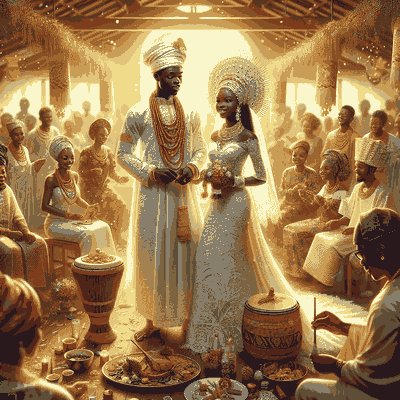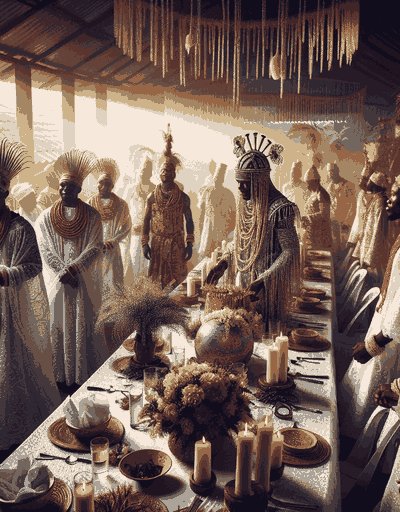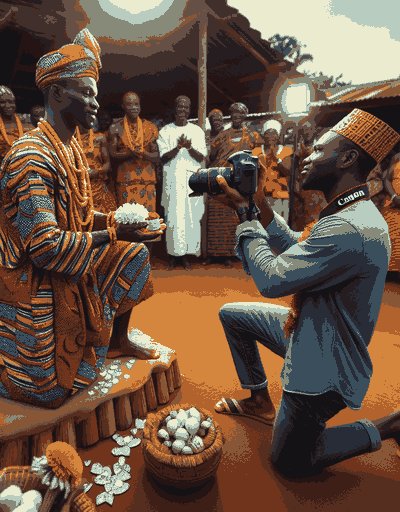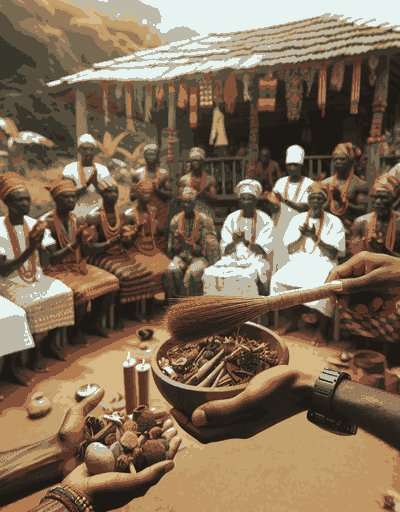Liberia Wedding Traditions
Liberian wedding traditions are multi-day celebrations combining 16+ ethnic customs, American influences, and sacred ceremonies that typically involve 150-300 guests and cost $2,000-$10,000 USD. These traditions encompass pre-wedding negotiations, ceremonial rituals like the kola nutKOH-lah nut untying, traditional attire changes, and elaborate receptions, creating celebrations that typically last 2-3 days and unite entire communities.

Complete Liberian Wedding Process Timeline

- 6-12 months before: Introduction ceremonyin-troh-DUK-shun SAIR-eh-moh-nee and family negotiations
- 3-6 months before: Dowry discussions and agreement ($48-$500 USD)
- 1-3 months before: Gift preparations for bride’s extended family
- Wedding week: Traditional ceremonies (2-3 days)
- Wedding day: Multiple ceremonies including bride selection, kola nutKOH-lah nut ritual, water blessingWAH-ter BLESS-ing
- Post-wedding: Family integration customs (ongoing)
What Are Liberian Pre-Wedding Traditions?

Liberian pre-wedding traditions establish family connections and formalize marriage intentions through structured ceremonies lasting 3-6 months. These customs include the formal Introduction ceremonyin-troh-DUK-shun SAIR-eh-moh-nee, dowry negotiations standardized at $48 USD, and extensive gift exchanges between families.
Introduction Ceremony: The First Formal Step
The Introduction ceremony is a formal meeting where the groom’s family visits the bride’s family to express marriage intentions, typically involving 10-20 family members and costing $200-$500 USD. This centuries-old practice requires the groom’s uncle to lead negotiations, saying “we saw someone in your house that we would love to marry,” demonstrating cultural respect and humility.
The ceremony follows specific protocols:
- Groom’s uncle leads: Makes formal request to bride’s family
- Small gifts presented: Shows respect (valued at $50-$100 USD)
- Bride’s uncle responds: Has authority even with father present
- Family discussion: Private consultation before response
- Timeline set: If accepted, next steps planned
Similar to other West African traditions, this ceremony emphasizes collective family involvement rather than individual choice, reflecting the communal nature of Liberian society where 65% of marriages still involve extensive family participation.
Dowry Negotiations and Cultural Evolution
Liberian dowry (en_doe-reeEN-doh-ree) is a standardized payment of $48 USD established by elders to prevent financial exploitation, though modern adjustments range from $48-$500 based on education and career achievements. This traditional practice, dating back centuries, evolved from substantial payments that sometimes created marital problems to a symbolic amount promoting family harmony.
Key dowry components include:
- Base amount: $48 USD (standard across all ethnic groups)
- Educational adjustments: Additional $50-$200 for college graduates
- Career recognition: Extra $50-$150 for professional women
- Delivery deadline: Must be completed before 5 PM on designated day
- Accompanying gifts: Clothing and household items ($100-$300 value)
Modern dowry practices recognize women’s achievements while maintaining cultural continuity. A recent example involved a $248 dowry acknowledging the bride’s master’s degree and nursing career, demonstrating how tradition adapts to contemporary values while preserving symbolic significance.
Gift Exchange Customs Between Families
Liberian gift-giving traditions require the groom’s family to present gifts worth $500-$2,000 USD to the bride’s extended family members, not just the couple. This practice, involving 15-30 recipients, symbolizes the union of two families and establishes lasting bonds between relatives.
Traditional gift categories:
- For parents: Formal attire, jewelry ($200-$500)
- For siblings: Accessories, electronics ($50-$150 each)
- For grandparents: Traditional cloth, comfort items ($100-$200)
- For uncles/aunts: Practical household items ($50-$100 each)
Regional variations affect gift selection, with Kpelle families favoring traditional country clothKUN-tree klawth while Mandingo families often include religious items. This extensive gift-giving differentiates Liberian customs from Western practices where gifts primarily benefit the couple.
Traditional Liberian Wedding Ceremonies

Traditional Liberian wedding ceremonies combine indigenous rituals with modern elements across 2-3 days of celebration. These ceremonies include both customary marriages following tribal law and statutory marriages adhering to civil requirements, with 70% of couples choosing both forms.
Two Forms of Marriage in Liberia
Customary marriageKUS-tuh-mair-ee MAIR-ij is a traditional union following indigenous laws that permits polygamy and involves full tribal ceremonies costing $1,000-$3,000 USD. Statutory marriageSTAT-yoo-tor-ee MAIR-ij is a civil ceremony requiring monogamy, legal registration, and typically costs $500-$1,500 USD including documentation.
Marriage type comparison:
| Aspect | Customary Marriage | Statutory Marriage |
|---|---|---|
| Legal wives allowed | Multiple permitted | One only |
| Ceremony duration | 2-3 days | 1 day |
| Average cost | $1,000-$3,000 USD | $500-$1,500 USD |
| Legal requirements | Tribal customs | Civil registration |
| Divorce process | Family mediation | Court proceedings |
Contemporary couples increasingly opt for dual ceremonies, honoring traditional heritage while securing modern legal protections. This approach, practiced by approximately 45% of urban couples, reflects Liberia’s evolving social landscape.
Bride Imposter Ceremony (Selection)
The Selection ceremonyseh-LEK-shun SAIR-eh-moh-nee is an entertaining tradition where the groom must identify his bride among 5-10 covered women, paying $5-$20 USD for each incorrect guess. This joyful custom tests the groom’s spiritual connection to his bride while creating community entertainment lasting 30-60 minutes.
The ceremony process includes:
- Women preparation: 5-10 volunteers fully covered in matching fabric
- Groom enters: Must rely on intuition, not physical recognition
- Each selection: Costs $5-$20 if incorrect
- Community participation: Guests cheer and offer hints
- Final revelation: True bride unveiled to celebration
This tradition generates $50-$200 for the bride’s family while creating memorable moments. Modern ceremonies sometimes include up to 15 “brides” to increase suspense and entertainment value, particularly in diaspora weddings where guests may be unfamiliar with the custom.
Sacred Kola Nut Untying Ritual
The kola nutKOH-lah nut ceremony (en_koh-lah_nutKOH-lah nut) is Liberia’s most sacred wedding ritual where the bride unties nuts bound with thin threads while the groom’s family showers her with money, typically collecting $200-$1,000 USD. This centuries-old tradition symbolizes patience, dedication, and the careful work required to maintain a successful marriage.
Ceremonial elements:
- Preparation: Kola nuts wrapped in leaves with 50-100 thin threads
- Untying process: Takes 20-40 minutes of careful work
- Money shower: $1-$20 bills thrown continuously
- Bride’s “exhaustion”: Playful pauses prompt more money
- Final sharing: Pieces distributed to 20-30 family members
The untied kola nut pieces are shared among relatives, symbolizing peace and prosperity. Each ethnic group adds variations: Kpelle ceremonies include specific chants, while Bassa traditions require elder blessings before distribution.
Water Blessing and Parental Approval
The water blessingWAH-ter BLESS-ing ceremony involves the bride bringing blessed water to her groom after her father’s prayers, symbolizing her commitment to nurture the marriage. This 15-minute ritual occurs after the kola nut ceremony and represents the transfer of spiritual protection from the bride’s family.
Blessing components:
- Glass preparation: Clean water in ceremonial cup
- Father’s prayer: 3-5 minutes invoking peace and prosperity
- Bride’s presentation: Kneeling while offering water
- Groom’s acceptance: Drinks to seal the blessing
- Family witness: 20-30 relatives observe silently
Regional variations include Mandingo Islamic prayers in Arabic alongside traditional blessings, while Gio customs may substitute maternal uncle blessings when fathers are absent.
Tribal Attire Change Ceremony
The attire change ceremony demonstrates cultural unity when couples change from the bride’s tribal clothing (worth $300-$800) to the groom’s tribal attire (worth $400-$1,000) during the reception. This visual transformation, lasting 20-30 minutes, symbolizes the bride’s integration into her husband’s family while honoring both heritages.
Common attire combinations:
- Kpelle to Mandingo: Country clothKUN-tree klawth to embroidered white/gold
- Bassa to Grebo: Printed designs to woven patterns
- Gio to Mano: Earth tones to bright ceremonial colors
- Mixed heritage: Multiple changes honoring all backgrounds
This tradition has gained popularity in inter-tribal marriages, affecting 60% of contemporary unions. Professional photographers particularly value this ceremony for creating meaningful visual documentation of Liberia’s cultural diversity.
Liberian Wedding Reception Traditions
Liberian wedding receptions feature elaborate celebrations lasting 4-8 hours with traditional music, choreographed dances, and money-spraying customs. These events typically accommodate 150-300 guests and cost $1,500-$5,000 USD including venue, catering, and entertainment.
Traditional Music and Dance Performances
Liberian wedding music combines indigenous instruments like drums and saasaaSAH-sahen_sah-sah"term-wrapper" id="def-en-sah-sah-429">en_sah-sahSAH-sah) rattles with modern sounds, creating celebrations featuring songs in English and 16+ tribal languages. Traditional musicians charge $200-$500 while modern DJs cost $300-$800, with 80% of couples hiring both.
Musical elements include:
- Traditional drums: 3-5 different types ($100-$300 rental)
- Saasaa rattles: Beaded gourds for rhythm
- Yomo GorYOH-moh gore: Xylophone-like instrument for melody
- Language diversity: Songs in Kpelle, Bassa, Mandingo, English
- Performance duration: 2-3 hours of traditional sets
Modern adaptations blend Afrobeat, highlife, and American music with traditional sounds. Diaspora weddings often feature fusion bands specializing in Liberian-American musical combinations, charging $1,000-$2,500 for full receptions.
The Grand March Processional Dance
The Grand Marchgrand march is a 30-60 minute choreographed processional featuring the wedding party in white sequined African attire (worth $200-$500 per outfit) performing synchronized movements. This tradition blends indigenous dance with Western processional elements, creating a spectacular visual display.
March components:
- Formation entrance: Couples enter in specific order
- Pattern transitions: 5-8 different configurations
- Musical accompaniment: Traditional and modern blend
- Guest participation: Selected family members join
- Finale formation: Heart or circle symbolizing unity
Contemporary couples hire choreographers ($200-$500) to create unique Grand March routines incorporating both traditional Liberian movements and modern dance trends, particularly for videography purposes.
Money Spraying Celebration
Money sprayingMUH-nee SPRAY-ing (en_muh-nee_spray-ingMUH-nee SPRAY-ing) is a joyful tradition where guests throw $500-$3,000 USD total on the dancing couple to wish prosperity, with bridesmaids collecting bills in special baskets. This practice, shared across West Africa, demonstrates community support and creates exciting reception moments.
Spraying customs:
- Timing: Throughout dancing, peaks during couple’s solos
- Denominations: $1-$100 bills (mostly $1-$20)
- Participants: Elders initiate, all guests join
- Collection: 3-5 bridesmaids with decorated baskets
- Final count: Conducted privately after reception
Diaspora adaptations include “money trees” or decorated boxes for more organized collection, though traditional spraying remains preferred for its visual impact and celebratory atmosphere.
Regional and Tribal Wedding Variations
Liberia’s 16 ethnic groups maintain distinct wedding customs while sharing core ceremonial elements. These variations reflect diverse cultural values, with costs ranging from $1,500-$5,000 depending on ethnic traditions and family expectations.
Kpelle Wedding Traditions (31.5% of Population)
Kpelle wedding traditions emphasize matrilineal authority where maternal uncles lead negotiations, with ceremonies featuring specific kola nutKOH-lah nut patterns and country clothKUN-tree klawth worth $400-$800. As Liberia’s largest ethnic group, Kpelle customs influence national wedding practices significantly.
Distinctive Kpelle features:
- Uncle authority: Maternal uncle gives bride away
- Kola nut threads: Red and white pattern significance
- Country cloth: Specific weaving patterns for weddings
- Wedding duration: Typically 3 days
- Average cost: $2,000-$4,000 USD total
Kpelle ceremonies incorporate agricultural symbolism reflecting their farming heritage, with specific seasons preferred for weddings based on harvest cycles.
Mandingo Wedding Customs (15.2% of Population)
Mandingo weddings integrate Islamic traditions with indigenous customs, featuring Arabic prayers, white/gold embroidered attire worth $500-$1,200, and gender-separated celebrations. These ceremonies typically cost $2,500-$5,000 reflecting elaborate decorations and extended guest lists.
Mandingo specifications:
- Religious integration: Quranic readings with tribal rituals
- Attire colors: White and gold predominance
- Celebration style: Separate male/female gatherings
- Music restrictions: Traditional instruments preferred
- Food requirements: Halal catering mandatory
The synthesis of Islamic and indigenous elements creates unique ceremonies where morning prayers precede traditional afternoon rituals, demonstrating successful cultural integration.
Bassa Wedding Practices (13.4% of Population)
Bassa weddings feature extensive ancestor acknowledgment ceremonies with libations, distinctive vocal harmonies, and community-wide participation involving 200-400 guests. These celebrations emphasize collective responsibility and typically cost $1,500-$3,500.
Bassa ceremonial elements:
- Ancestor libations: Rice wine or palm wine offerings
- Vocal traditions: Call-and-response singing patterns
- Community roles: Specific assignments for 50+ people
- Dance formations: Circular patterns symbolizing unity
- Duration: 2-day minimum celebrations
Bassa traditions particularly emphasize artistic expression through song and dance, with some ceremonies featuring 20-30 different traditional songs performed throughout the celebration.
Modern Adaptations and Diaspora Practices
Contemporary Liberian weddings blend traditional elements with modern innovations, particularly among the 500,000+ diaspora members worldwide. These adaptations maintain cultural authenticity while accommodating international contexts and mixed-culture marriages.
American-Liberian Wedding Influences
American-Liberian wedding traditions merge 19th-century American customs brought by freed slaves with indigenous practices, creating unique ceremonies featuring quilted gifts, Western attire elements, and formal processionals. This historical fusion affects 25% of contemporary Liberian weddings.
Historical adaptations include:
- Quilting traditions: Wedding quilts worth $200-$500
- Veil incorporation: Added to traditional head wraps
- Reception format: Seated dinners with traditional dancing
- Music blend: Gospel music with tribal songs
- Cake customs: Multi-tier cakes with kola nutKOH-lah nut decorations
Modern Monrovia weddings particularly show this influence, with couples choosing buffet-style receptions accommodating both Western and traditional dining preferences.
Diaspora Wedding Innovations
Diaspora Liberian weddings use technology to include distant relatives, with 85% incorporating livestreaming for traditional ceremonies and creating fusion celebrations costing $5,000-$15,000 USD. These innovations maintain cultural connections across continents while adapting to local contexts.
Contemporary diaspora trends:
- Dual ceremonies: Traditional in Liberia, Western abroad
- Virtual participation: Zoom ceremonies for elders
- Cultural education: Programs explaining traditions
- Fusion catering: Liberian dishes with local cuisine
- Bilingual ceremonies: English plus tribal language
Digital documentation has become crucial, with couples investing $1,000-$3,000 in professional photography/videography specifically to preserve traditional elements for future generations.
Las Vegas Liberian Wedding Options
Las Vegas wedding venues now offer Liberian cultural packages including kola nut ceremonies, traditional music, and African catering for $3,000-$10,000. These specialized services cater to the growing African diaspora seeking culturally authentic celebrations in unique settings.
Vegas adaptation options:
- Chapel customization: Traditional decorations available
- Cultural consultants: $500-$1,000 for ceremony planning
- Music services: DJs trained in African music
- Catering options: West African menus available
- Extended venues: 8-hour receptions accommodated
Several Vegas wedding planners now specialize in African ceremonies, offering packages that include traditional fabric decorations, culturally appropriate photography, and guidance on incorporating customs like money sprayingMUH-nee SPRAY-ing within Nevada gaming regulations.
Contemporary Trends and Statistics
Modern Liberian weddings in 2025 show significant evolution while maintaining core traditions. Recent surveys indicate 78% of couples include at least five traditional elements, with costs averaging $3,000-$8,000 for complete celebrations.
Most Popular Traditions in 2025
Current tradition popularity (percentage of weddings including):
- Introduction ceremonyin-troh-DUK-shun SAIR-eh-moh-nee: 95% participation rate
- Kola nutKOH-lah nut ritual: 89% include this sacred element
- Money sprayingMUH-nee SPRAY-ing: 85% feature this prosperity wish
- Traditional music: 82% hire traditional musicians
- Dowry customs: 78% follow modified versions
- Bride selection: 72% include for entertainment
- Attire changes: 68% especially inter-tribal couples
- Water blessingWAH-ter BLESS-ing: 65% maintain this ritual
- Grand Marchgrand march: 61% perform choreographed processional
- Two ceremonies: 45% have both customary and statutory
Declining or Evolving Practices
Less common traditions in contemporary weddings:
- Arranged marriages: Only 12% fully arranged
- Polygamous unions: 8% in urban areas, 22% rural
- Extended integration rituals: Shortened to 1-2 days
- Strict sunset deadlines: 35% maintain 5 PM rules
- Gender-separated celebrations: 28% fully separate
These changes reflect urbanization, education, and diaspora influences while preserving essential cultural elements. Young couples particularly focus on celebratory aspects while modifying practices they view as outdated.
Cost Analysis and Budget Trends
2025 Liberian wedding costs range from $2,000-$10,000 with urban celebrations averaging $5,500 and rural ceremonies $3,000. These figures represent 6-18 months of average income, making weddings significant financial investments for families.
Typical budget breakdown:
- Traditional ceremonies: $1,000-$2,500 (25%)
- Reception venue/catering: $1,500-$3,500 (35%)
- Attire (both families): $800-$2,000 (20%)
- Music/entertainment: $500-$1,500 (10%)
- Photography/videography: $400-$1,000 (10%)
Diaspora weddings typically cost 2-3 times more due to international travel, dual ceremonies, and higher service costs in Western countries. Crowdfunding has become common, with 35% of couples using online platforms to offset expenses.
How much does a traditional Liberian wedding cost?
Traditional Liberian weddings cost $2,000-$10,000 USD total, with customary ceremonies requiring $1,000-$3,000 and receptions adding $1,500-$5,000. Urban celebrations average $5,500 while rural weddings average $3,000, representing 6-18 months of typical income. Diaspora weddings often cost $5,000-$15,000 due to travel and dual ceremonies.
What is the significance of the kola nut ceremony?
The kola nutKOH-lah nut ceremony symbolizes patience, unity, and prosperity through the bride’s careful untying of threads while receiving money blessings worth $200-$1,000. This sacred ritual, taking 20-40 minutes, represents the delicate work required in marriage and concludes with sharing nut pieces among 20-30 family members for communal blessing.
How long do Liberian wedding celebrations last?
Liberian weddings typically span 2-3 days including pre-wedding ceremonies, the main wedding day, and post-wedding celebrations. The Introduction ceremonyin-troh-DUK-shun SAIR-eh-moh-nee occurs 3-6 months prior, while the actual wedding events involve 8-12 hours of ceremonies and 4-8 hour receptions accommodating 150-300 guests.
Can non-Liberians participate in traditional ceremonies?
Yes, non-Liberian partners fully participate in ceremonies with 68% of inter-cultural couples incorporating both traditions. The attire change ceremony particularly honors multiple heritages, while ceremonies include explanations for non-Liberian guests. Cultural consultants ($500-$1,000) help navigate traditional requirements respectfully.
What’s the difference between customary and statutory marriage?
Customary marriageKUS-tuh-mair-ee MAIR-ij follows tribal law permitting polygamy with 2-3 day ceremonies costing $1,000-$3,000, while statutory marriageSTAT-yoo-tor-ee MAIR-ij requires monogamy with civil registration costing $500-$1,500. About 45% of urban couples choose both forms, honoring tradition while securing legal protections.
What gifts are appropriate for Liberian weddings?
Traditional gifts worth $50-$200 include household items, clothing, or money presented to the bride’s extended family (15-30 recipients) rather than just the couple. Cash gifts during money sprayingMUH-nee SPRAY-ing average $20-$100 per guest, contributing to $500-$3,000 total collected for the newlyweds’ prosperity.
Are arranged marriages still common in Liberia?
Only 12% of contemporary Liberian marriages are fully arranged compared to 60% historically. Modern couples typically choose partners independently but seek family approval, with 88% involving families in introduction ceremonies. Rural areas maintain higher rates (30%) of family-guided partnerships.
How do diaspora Liberians maintain wedding traditions?
Diaspora couples preserve traditions through dual ceremonies, livestreaming, and cultural adaptations with 85% including virtual participation for distant relatives. Common approaches include traditional ceremonies in Liberia followed by Western celebrations abroad, or fusion events incorporating key elements like kola nut ceremonies in Western venues.
What role does religion play in Liberian weddings?
Religious elements vary by ethnic group and personal belief, with Muslim Mandingo incorporating Islamic prayers while Christian families add church ceremonies. Traditional African spiritual practices remain in rituals like ancestor libations (Bassa) and blessing ceremonies, creating multi-faith celebrations reflecting Liberia’s religious diversity.
Can same-sex couples have traditional Liberian weddings?
Same-sex marriages aren’t legally recognized in Liberia, but diaspora communities increasingly adapt traditions for LGBTQ+ couples. Some families privately perform modified ceremonies focusing on cultural rather than legal aspects, particularly in countries where same-sex marriage is legal, though this remains culturally sensitive requiring family-specific navigation.
Frequently Asked Questions
How much does a traditional Liberian wedding cost?
A traditional Liberian wedding typically costs between $2,000-$10,000 USD, representing 6-18 months of income. This includes dowry payments, ceremony costs, and reception expenses.
What is the minimum dowry payment in Liberia?
The base dowry payment in Liberia is $48 USD, though this amount increases based on the bride's education level and career status.
How long do Liberian wedding celebrations last?
Traditional Liberian weddings are multi-day events, typically lasting 2-3 days for ceremonies, with pre-wedding events spanning several months.
What is the kola nut ceremony in Liberian weddings?
The kola nut ceremony is a sacred ritual where the bride unties kola nuts and receives monetary blessings, symbolizing unity and prosperity.
How many guests attend a typical Liberian wedding?
Liberian weddings typically host between 150-300 guests, reflecting the community-oriented nature of these celebrations.
What is money spraying at Liberian weddings?
Money spraying is a celebratory custom where guests shower the couple with cash during the reception, typically totaling $500-$3,000 USD.
Are Liberian weddings religious ceremonies?
Liberian weddings can be either customary (traditional) or statutory (civil/religious), with different rules regarding polygamy and monogamy.
What is the bride selection ceremony?
In this traditional ceremony, the groom must identify his bride among several covered women, demonstrating his commitment and connection.
How do modern Liberian-American couples celebrate?
Modern Liberian-American couples often combine traditional elements with Western customs, including dual ceremonies and virtual participation options.
What should guests wear to a Liberian wedding?
Guests typically wear traditional African attire or formal Western clothing, with specific colors or patterns often requested by the couple.